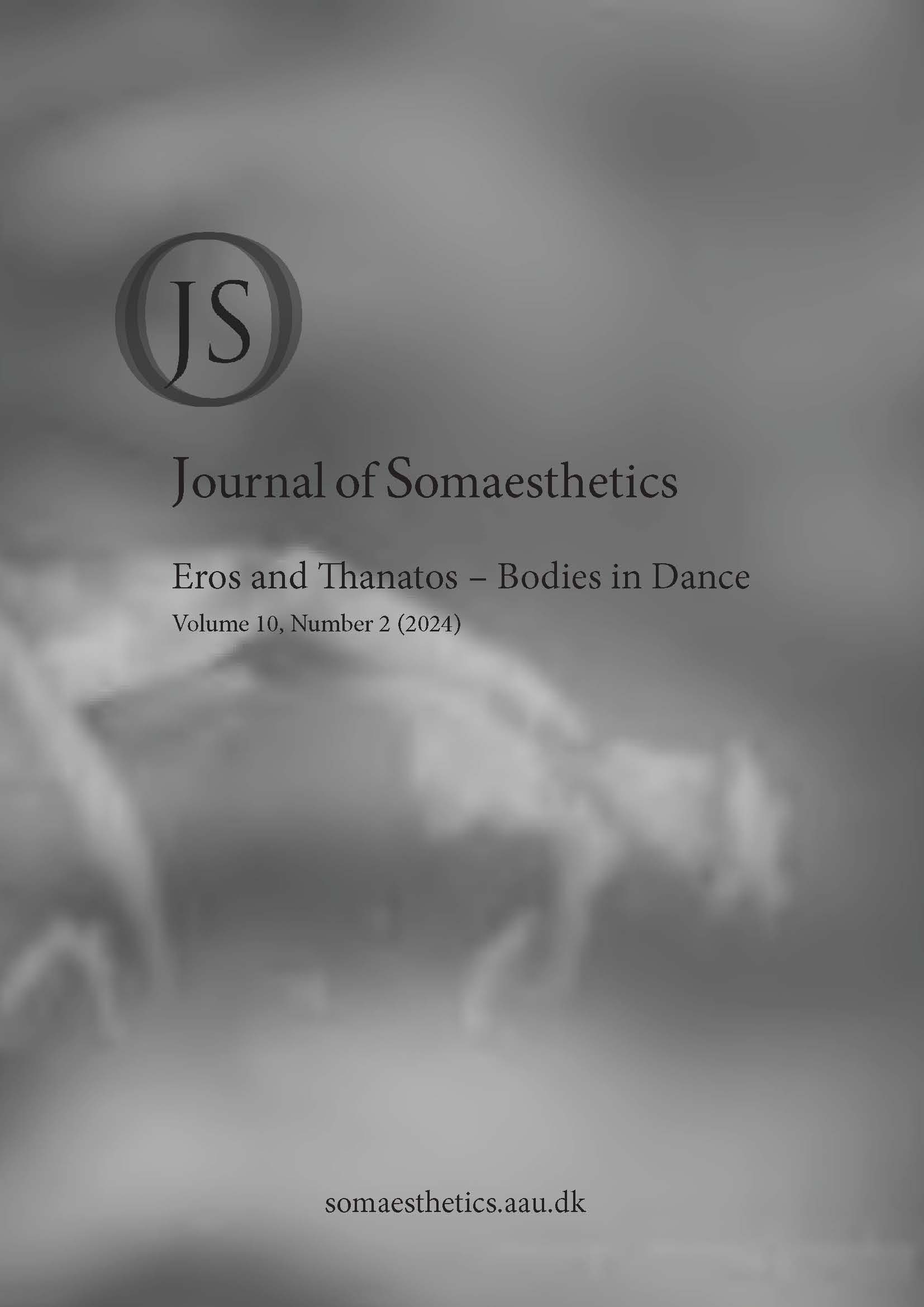Somaesthetics and Dance
The Convergence of Bharatanatyam and Yoga in Kundalini Pattu
DOI:
https://doi.org/10.54337/ojs.jos.v10i2.8511Abstract
This paper performs a Somaesthetic evaluation of Kundalini Pattu: A Dance-Yoga, a dance performance portraying the spirit of Kundalini as creation of life and life forces after death. The discussion laid out in three sections uses Shusterman’s philosophy of Analytic, Pragmatic and Practical somaesthetics to evaluate the two performances of this choreography, one featuring Guru Reshmi Narayanan and the other her students. The study attempts to establish the disciplining of the soma as a necessary condition for the attainment of aesthetic perfection in Bharatanatyam, the South Indian classical dance tradition.
Keywords: Somaesthetics, Dance, Bharatanatyam, Yoga, Kundalini
References
Abraham, T. (2008). Yoga. a pragmatic science. Yuvatha Publications.
Ademarsh. (2023, April 13). One-Legged King Pigeon Pose. Retrieved from http://www.yogajournal.com/poses/one-legged-king-pigeon-pose/
Arnheim, R. (1975). Toward a psychology of art. California: Univ. Of California Press.
Arnold, P. J. (2005). Somaesthetics, Education, and the Art of Dance on Journal of Aesthetic Education, 39(1), 48–64. Retrieved from http://www.jstor.org/stable/3527349
Banerjee, S. & Fiala, J (2020). Somaesthetics and Embodied Dance Appreciation: A Multisensory Approach.
Bhavnani, A. B., & Bhavnani, D. (n.d.). BHARATANATYAM AND YOGA. YOGANJALI NATYALAYAM. Retrieved from http://www.dhdi.free.fr/recherches/horizonsinterculturels/articles/bharatanatyamyoga.pdf
Carter, C.L. (2015). Somaesthetics and Dance. Contemporary Pragmatism, 12(1), 100–115. doi:10.1163/18758185-01201006.
Coorlawala, U. A. (2004). The Sanskritized body. Dance Research Journal, 36(2), 50–63. https://doi.org/10.2307/20444591
Gherwal, R. S. (1930). Kundalini, the Mother of the Universe: Samadhi Yoga. Retrieved from https://sacred-texts.com/hin/kmu/kmu10.htm
Jayaram, P. (2020). Laban Movement Analysis as an Aid to Teach Bharatanatyam Dance Form: A Literature Review. Retrieved from https://digitalcommons.lesley.edu/expressive_theses/258
Kavya. (2016). Yoga and Pranayama. IJAAM, 4(2). Retrieved from https://journals.indexcopernicus.com/api/file/viewByFileId/123590.pdf
Kibler, W. B., Press, J., & Sciascia, A. (2006). The Role of Core Stability in Athletic Function. Sports Medicine, 36(3), 189–198. https://doi.org/10.2165/00007256-200636030-00001
Kundalini pattu-poem by Sree Narayana guru. (2017). Retrieved from https://gurudevacharithram.blogspot.com/2017/04/kundalinippattu-poem-by-sree-narayana.html
Ljubojevic, A., Popovic, B., Bijelic, S., & Jovanovic, S. (2020). Proprioceptive training in dance sport: effects of agility skills. Turkish Journal of Kinesiology, 6(3), 109–117. https://doi.org/10.31459/turkjkin.742359
Mani, C. (2020). CompoSing Awareness: Approaching Somaesthetics Through Voice and Yoga. ResearchGate, 67–85. Retrieved from https://www.researchgate.net/publication/338293783_Composing_Awareness_Approaching_Somaesthetics_Through_Voice_and_Yoga
Marchand, P. (2006). The Yoga of the Nine Emotions. Simon and Schuster. Retrieved from http://books.google.ie/
Mehdi, S. (2023, December 15). What Is Reverse Prayer Yoga And What Are Its Benefits? Retrieved from http://www.stylecraze.com/articles/what-is-reverse-prayer-yoga-and-its-benefits
Merleau-Ponty, Maurice. (2014). Phenomenology of Perception. Trans. Landes, Donald A. London, New York: Routledge.
Mullis, E. C. (2006). Performative Somaesthetics: Principles and Scope. the Journal of Aesthetic Education 40(4), 104–117. https://doi.org/10.1353/jae.2006.0036
Muni, B. and Srinivasa, R. (1977). Natyasastra : Translation of Bharatha Natyasastra. Bangalore: Suvani Prakasana.
Narayanan. (2017, March 26). KUNDALINIPATTU - a “Nrutha- Yoga” performance by RESMI NARAYANAN [Video file]. Retrieved from https://www.youtube.com/watch?v=k1Uxg1yLEYA
Penkar, L., & Sadhale, A. (2020). Balance in Bharatanatyam dancers and non-dancers: A comparative study. Journal of Society of Indian Physiotherapists, 4(2), 92–96. https://doi.org/10.18231/j.jsip.2020.014
Rizopoulos, N. (2021, November 8). The King of Hip Openers: Pigeon Pose. Retrieved from https://www.yogajournal.com/practice/beginners/pigeon-pose/
Samanta, S., Bachhar, T., & Nayek, B. (2016). A comparative study on kinaesthetic perception and reaction ability between Kathak and Aerobics dancers. International Journal of Physiology, Nutrition and Physical Education, 1(2), 74–76. Retrieved from https://www.journalofsports.com/pdf/2016/vol1issue2/PartB/1-2-10-660.pdf
Shusterman, R. (1999). Somaesthetics: A Disciplinary Proposal. The Journal of Aesthetics and Art Criticism, 57(3). doi:10.2307/432196.
Shusterman, R. (2008). Body consciousness : a philosophy of mindfulness and somaesthetics. Cambridge: Cambridge Univ. Press.
Shusterman, R. (2012) Thinking Through the Body: Essays in Somaesthetics.
Shusterman, R. (2018). Aesthetic experience and somaesthetics. Leiden ; Boston: Brill.
Shusterman, R. (2019). Dance as Art, Theatre, and Practice: Somaesthetic Perspectives. Midwest Studies In Philosophy, 44(1), 143–160. https://doi.org/10.1111/MISP.12125
Sivananda, S. (1994). Kundalini Yoga. The Divine Life Society. Retrieved from https://dlshq.org/download2/kundalini.pdf
Stephens, M. (2010). Teaching Yoga: Essential Foundations and Techniques. Berkeley:
North Atlantic Books.
Stevens, C. J., Vincs, K., deLahunta, S., & Old, E. (2019). Long-term memory for contemporary dance is distributed and collaborative. Acta Psychologica, 194, 17–27. https://doi.org/10.1016/j.actpsy.2019.01.002
Sudha’s Sree Sankara School of Dance, Kalady. (2021, June 21). Happy International Yoga Day! Remembering SSD Special Production on Dance & Yoga - Kundalinippattu [Video file]. Retrieved from https://www.youtube.com/watch?v=DI1eWGL5-50
Tekin, D., Agopyan, A., & Baltaci, G. (2018). Balance training in modern dancers: proprioceptive-neuromuscular training vs kinesio taping. Medical Problems of Performing Artists, 33(3), 156- 165.
Temple dance. (n.d.). Retrieved from http://www.dollsofindia.com/read/temple-dance.htm
Nandikesvara (1917). The mirror of gesture, being the Abhinaya darpana of Nandikesvara. (1917). Retrieved June 7, 2023, from https://books.google.co.in/
Younger, P. (1995). The home of dancing Śivan: the traditions of the Hindu temple in Citamparam. New York: Oxford University Press.
Downloads
Published
Issue
Section
License
Copyright (c) 2024 Pooja Sunil, Vinod Balakrishnan

This work is licensed under a Creative Commons Attribution-NonCommercial-NoDerivatives 4.0 International License.
Articles published in The Journal of Somaesthetics are following the license Creative Commons Attribution-NonCommercial-NoDerivs 4.0 Unported (CC BY-NC-ND 4.0). Authors retain copyright and grant the journal right of first publication with the work simultaneously licensed under a Creative Commons Attribution License: Attribution - NonCommercial - NoDerivs (by-nc-nd). Further information about Creative Commons
If excerpts, tables, figures, charts, artwork or photographs from other copyrighted works are included in an article, it is the author’s responsibility to obtain written permission from the copyright owners and credit the source’s in the article and citation list.


